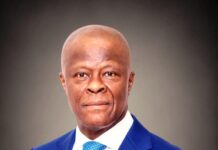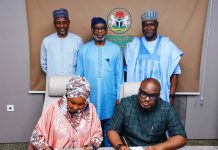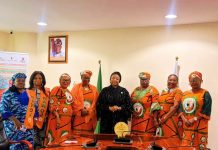I am delighted to welcome you to this crucial National GEWE Coordination Mechanism and Institutional Strengthening Meeting, convened by the Federal Ministry of Women Affairs in collaboration with UN Women. This gathering is both timely and strategic, bringing together key stakeholders from across Nigeria to deepen institutional coordination, enhance accountability, and catalyse transformative action toward achieving gender equality and sustainable development.
- Our goal here today is clear: to build a unified and results-driven national GEWE architecture. This requires strengthened collaboration between the Federal and State Ministries of Women Affairs, as well as effective integration with broader government systems. Our Ministries are not symbolic entities; they are catalysts for economic growth, national stability, and social justice.
- I charge all State Commissioners and Permanent Secretaries to proactively build inter-ministerial and inter-agency partnerships in your States. Women’s Affairs must no longer be treated as peripheral. We must be seen, and act, as central players in policy, planning, and national development.
- Let me draw our collective attention to the stark realities that demand urgent and innovative responses:
- Women and girls make up over 49% of Nigeria’s population, yet:
- Only 17% of women aged 15–49 have completed secondary education;
- Maternal mortality remains at a staggering 512 deaths per 100,000 live births;
- Nearly 50% of children under five face some form of malnutrition;
- Over 98,000 women die annually from indoor air pollution caused by firewood and biomass cooking;
- In the creative sector, women hold less than 20% of key production and executive roles.
- These are not just statistics; they are urgent calls to action.
5. This year, we mark 30 years since the establishment of the Federal and State Ministries of Women Affairs. It is a moment for both celebration and introspection. We must ask: What legacy are we building? How do we shift from programme-based to systems-based impact?
6. As part of our institutional strengthening efforts, I am pleased to announce the distribution of ICT equipment to all State Ministries of Women Affairs, made possible by UN Women under the leadership of Beatrice Eyong. These are not ornamental; they are strategic tools for data-driven programming, M&E, coordination, and digital reporting. I urge you to use them effectively and accountably.
7. In furtherance of our National Women’s Economic Empowerment (WEE) Policy, all States must work towards domestication and localization, especially at the Local Government level, where the impact is most felt. Let us mainstream WEE into all GEWE-related programming.
8. Following Nigeria’s active participation at CSW69, I encourage every State to host post-CSW debriefing sessions and integrate key learnings into planning and implementation cycles. The outcomes on financing for development, care economy recognition, digital inclusion, and institutional accountability must not end in New York. Let us internalize them into national and subnational policies.
9. We are also advancing women’s inclusion in trade and economic transformation, through our strategic engagement with the African Continental Free Trade Agreement (AfCFTA). Our focus is on linking women-led cooperatives, SMEs, and agribusinesses to continental trade ecosystems, especially through the upcoming WAVE Renewed Hope Social Impact Programme, which will identify one priority commodity per State for women’s agricultural advancement. In this we will also deepen our collaboration with the Ministry of Budget and National Planning
10. In terms of political participation, the statistics remain concerning; only 4 out of 109 Senators are women; 16 of 360 Members of the House of Representatives; a mere 57 out of 991 State Assembly Members are women. These figures highlight the urgent need for the Special Seats for Women Bill. I urge every Commissioner here to become an advocate and mobiliser; engage Governors, House Speakers, CSOs, and grassroots networks in your States.
11. I am pleased to announce that Tuesday, 9th July 2025, has been earmarked for a national-level dialogue on women’s political representation during the House of Representatives Open Week. The Federal Ministry will mobilise Commissioners, women leaders, and stakeholders to ensure strong representation. Please plan to participate.
12. I commend the States that have joined the Convention on the Elimination of All Forms of Discrimination Against Women (CEDAW) Cities Initiative, launched at CSW69 in New York. These include Edo, FCT, Kebbi, Imo, Lagos, Nasarawa, and Zamfara. Being a CEDAW City is a responsibility; it calls for deliberate, measurable, and inclusive actions at the local level.
13. I am pleased to announce that the next National Council on Women Affairs will be hosted in Edo State, with an expanded focus on Children and Family Cohesion, in line with our commitment to holistic social protection.
14. Nigeria continues to make notable progress in women’s representation:
- In the Judiciary, women now constitute 32% of judicial officers, surpassing the global average of 30%. Honourable Justice KudiratKekere-Ekun is the Chief Justice of Nigeria, and Justice Monica Dongban-Mensem heads the Court of Appeal. Kano, Plateau, Taraba, and Kaduna States have all appointed female Chief Judges; Justice DijeAboki being the first in Kano.
- In the Public Service, Mrs. Didi Walson-Jack currently serves as the Head of the Civil Service of the Federation, and we have also witnessed a woman as Accountant-General of the Federation, as well as a positive rise of women as Permanent Secretaries;
- In the Banking and Finance Sector, women hold over 27% of board seats and 33% of executive roles.
- In the Military, Nigerian women make up 27.9% of deployed peacekeepers, far exceeding the UN benchmark of 17%. A bill proposing 15% quotas for women in military appointments is under review.
- In Paramilitary services, women accounted for 35% of recruits in 2024, a quota now institutionalized across agencies including Immigration, NSCDC, Correctional Service, and Federal Fire Service.
15. In recognition of these efforts, we are institutionalising a National Reward and Recognition Framework to honour those who are championing gender inclusion and women’s advancement. You are giving us wings to fly and platforms to excel; we see you, and we will celebrate you.
16. Finally, I acknowledge the unwavering support of His Excellency, President Bola Ahmed Tinubu, GCFR, whose leadership under the Renewed Hope Agenda has placed women’s empowerment at the heart of national priorities. We equally celebrate Senator Oluremi Tinubu, CON, for her inspiring leadership of the Renewed Hope Initiative. I thank the National Assembly, State Governors, First Ladies, and State Houses of Assembly for championing inclusive governance and increased support for Women Affairs Ministries nationwide.
17. As we look to the future, let us convert this Coordination Mechanism into a Coalition for Action—resolute, responsive, and results-oriented.
18. Thank you for your presence, partnership, and leadership. Let us act boldly, collaborate intentionally, and deliver without delay.
God bless the Federal Republic of Nigeria.
Thank you.





